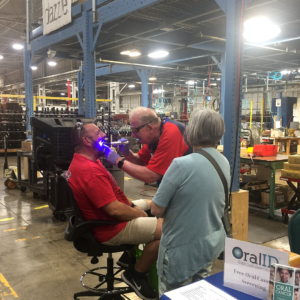Have You Gotten Screened For Oral Cancer Lately?
Throughout life people get regular prostate exams, mammograms and colonoscopies. These preventative health care exams are extremely important for detecting any abnormalities–including cancer–early, so they can be treated as soon as possible. These exams save lives. So do oral cancer screenings.
Unfortunately, many people don’t understand that a regular oral cancer screening is just as important as these other preventative exams. We want our patients to know that coming in to see us every six months isn’t just to make sure you don’t have cavities; it can actually save your life.
The Truth About Oral Cancer
There are 400,000 people throughout the world who are diagnosed with oral cancer every year–in the U.S. alone, that’s about 100 new cases every day. Oral cancer is a particularly deadly cancer, as only about half of oral cancer patients survive five years past their diagnosis.
These statistics are frightening, but there is some good news: early detection of oral cancer can boost survival rates 80 to 90 percent. The reason oral cancer is so harmful is because many patients aren’t diagnosed until late in the game. By raising awareness about this disease and the need for regular screenings, we hope to help stop that from happening.
Lifestyle Choices Can Put You At Higher Risk
Certain lifestyle activities can put you at a higher risk of developing oral cancer. Familiarize yourself with these risk factors:
- Tobacco use–Smoking and other tobacco use makes you three times more likely to develop oral cancer
- Age–Two-thirds of individuals with oral cancer are over age 55
- UV exposure–Frequent and prolonged exposure to sunlight increases your risk of developing lip cancer
- Alcohol consumption–Drinking alcohol more than doubles your risk of oral cancer
While knowing the risks can help us prevent oral cancer, it still occurs in people without any of the above risk factors. In fact, it is becoming increasingly more prevalent among non-smoking, healthy individuals. The reason for this shift is the rise of HPV, or human papillomavirus, a common sexually transmitted infection. Individuals with HPV are 32 times more likely to develop oral cancer–even more so than tobacco users.
Monitor Abnormalities And Get Regular Screenings
We’re all used to the occasional canker sore or sensitive cheek that we accidentally bit while eating dinner. While sores in the mouth are common, it’s important to remember that oral cancer often begins as a painless sore that simply outstays its welcome. If you experience any of these symptoms, come in to see us right away:
- A lump or thickening of your cheek
- A white or red patch on any part of your inner mouth or throat
- Numbness inside the mouth
- A sore inside your mouth that doesn’t heal within two weeks
- Difficulty with swallowing, chewing, or moving the tongue or jaw
The most important thing you can do to combat oral cancer is get regular screenings. Dental professionals are the first line of defense against this disease and we are often the first health care professionals to notice any abnormalities.
So, ask us more about oral cancer screenings when you come in for your biannual checkup. Or give us a call today to set up a screening for yourself or someone you care about. We want to see you healthy and smiling bright for a lifetime.

